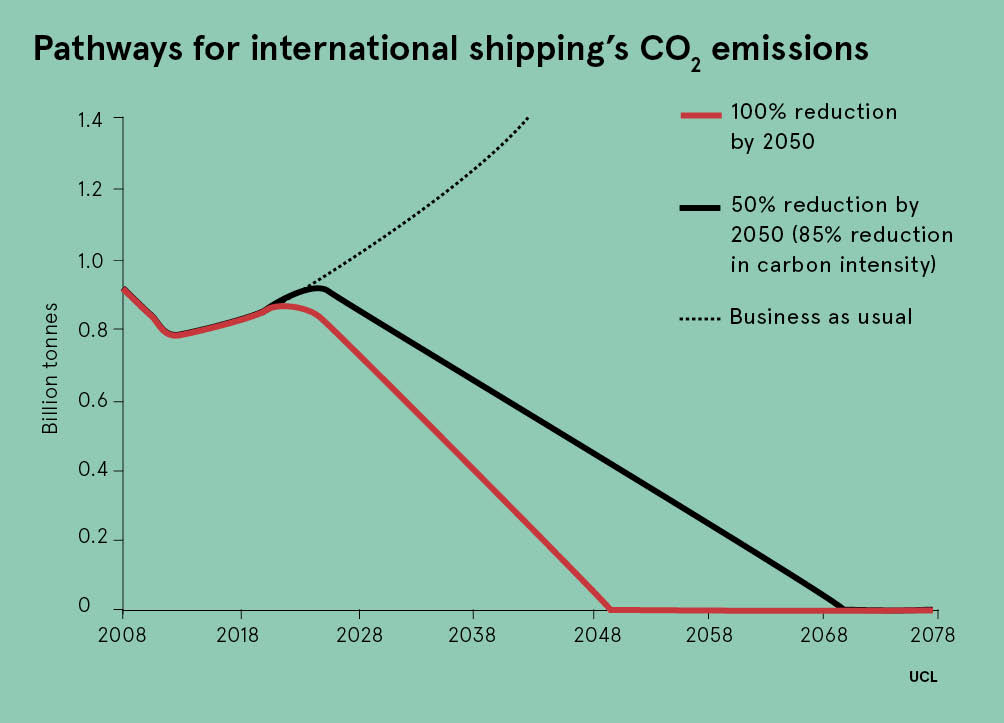
Alastair Marsh Chief executive, Lloyd’s Register
At the end of 2015, the Paris Agreement confirmed it was not a question of whether climate change should be addressed, but a question of how, and it was clear that everyone will have to contribute.
Shipping is the most efficient mode of transport and it currently accounts for 2.3 per cent of global CO2 emissions. However, in a study on GHGs in 2014, the International Maritime Organization (IMO) anticipated emissions will rise in all future scenarios, starting at 50 per cent and rising to 250 per cent under a business-as-usual scenario.
The temperature goals of the Paris Agreement, to stabilise temperature increases to below 2C and aim for 1.5C, place a challenging burden on all sectors. There will be no space in the carbon budget to allow the emissions of shipping, currently approximately 1 gigatonne a year, to be ignored.
In April 2018, the IMO adopted its initial GHG strategy, establishing a significant ambition for the shipping sector to reduce GHGs by at least 50 per cent by 2050, based on a 2008 baseline. There is also a strong emphasis on reducing by 100 per cent by 2050 if this is shown to be possible.
“When the IMO speaks about something like this, the whole industry has to listen,” says Alastair Marsh, chief executive at Lloyd’s Register (LR). “This deal provides a clear signal to the industry that the overarching aim is to end the use of fossil fuels.
“Fossil fuels provide us with a high-density, low-cost energy source that is comparatively easy to store, handle and transport. In terms of shipping, we have had decades to optimise the design, maintenance and operation of the shipping system around these fuels. As the world’s attitude towards fossil fuels is changing, shipping is working to find a non-fossil, zero-emission and sustainable energy source, but it’s a complex task.”
LR has worked with several academic partners to produce research reports looking at fuel and technology trends for the marine industry, including Shipping in Changing Climates, a $4‑million multi-university and cross-industry research project funded by the Engineering and Physical Sciences Research Council, and University Maritime Advisory Services, a partnership between the University College London Energy Institute and MATRANS,
These studies have made it clear that the industry needs to advance thinking beyond marginal gains in energy efficiency and alternative fossil fuels, and zero-emission vessels will need to be entering the fleet in 2030 and form a significant proportion of new builds from then on if the sector is meet the ambition set out by the IMO.
“This is probably the biggest single challenge facing the industry, over and above all the global trade movements and changes in trading patterns,” says Mr Marsh. LR has committed a significant chunk of
its research and development spending and efforts on looking at how viable zero-carbon fuels are as a scalable alternative.
“It’s things like battery-electric power and trying to store electric power, which is a massive engineering challenge, but also things like ammonia, potentially, or hydrogen,” he says.
“It is hard to predict the future, but we expect to see a diverse range of zero-carbon technologies and fuels deployed across the world’s fleet. There are a range of innovative technologies already being piloted and deployed, and we expect the curve of technological innovation to increase with the adoption of this strategy.”
Running parallel with the environmental challenges facing shipowners is a relatively overdue digital transformation of the industry. Countless other sectors have already seen much of their processes and models overhauled by the new data insights that come from providing digital services. Now, it seems, it is the turn of shipping.
We expect to see a diverse range of zero-carbon technologies and fuels deployed across the world’s fleet
The hype surrounding big data when it first rose to prominence five orso years ago unsurprisingly caused many shipowners in an old and traditional industry to raise a sceptical eyebrow. However, with much of the technology involved in data analytics now at a mature stage, it’s clear that it can be applied to very specific industry problems.
“It shouldn’t be digitisation for the sake of it, so let’s not talk about this wonderful big-data world when in reality it means different things to different sectors,” says Mr Marsh. “However, in shipping there is now a massive advantage to be gained in using data in the right way in terms of very practical applications.”
The airline industry has considerably advanced its approach to constantly monitoring engine performance, in real time, due to the capabilities available with data-analytics tools and Mr Marsh believes ships can now benefit massively from similar technology.
“You can take engine performance data in real time from sensors, which are embedded in most marine engines on ships today, harvest that data and apply data-analytics tools. Up until two or three years ago, that hadn’t been done at all in shipping,” he says.
“You can start to get some very interesting data about how to optimise the control settings of certain engines in certain weather conditions and modes, and you can start to improve the optimisation of fuel efficiency as a result of that.”

LR, which has been a trusted adviser to the maritime industry for close to 260 years, now provides services that enable shipowners to start harnessing the use of data to improve their processes and efficiencies. It is innovation in this area that underpins a strategy to build on LR’s long heritage and traditional classification services.
Due to this heritage, as well as advising shipowners when building and maintaining ships, LR also advises the IMO when formulating the rules shipowners will have to comply with and identifying practical issues that should be built in.
“When I talk to clients about their challenges, they tell me that we probably know as much about their ships as they do, but we’re also very aware of the bigger-picture implications around rule changes and other challenges,” says Mr Marsh. “At this major inflexion point for the maritime industry, we’re investing heavily to become a more innovative organisation and trusted adviser to our clients for 260 more years to come.”
For more information please visit lr.org


